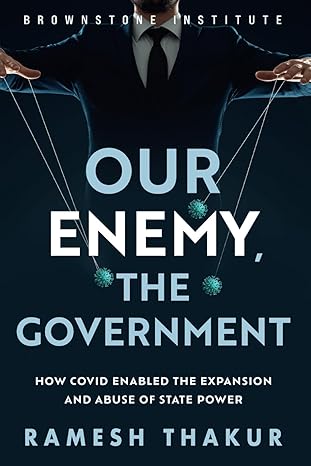From Professor Ramesh Thakur of the Australian National University
The following is an excerpt from Dr. Ramesh Thakur’s book, Our Enemy, the Government: How Covid Enabled the Expansion and Abuse of State Power.
The top global agency, part of the United Nations system, for promoting preparedness in advance for health emergencies and crises and coordinating national responses, is the World Health Organisation. Unfortunately, its performance in helping the world manage Covid-19 proved, to be kind, very patchy. This makes it all the more surprising that there should be a concerted effort underway to expand its authority and boost its resources.
WHO Wants a New Pandemic Treaty?
The Covid-19 crisis illustrates how the source and scope of many critical problems are global and require multilateral solutions, but the policy authority and requisite resources for tackling them are vested in states. An efficient architecture of global health governance would have detected the emerging epidemiological threat early, sounded the alarm, and coordinated the delivery of essential equipment and medicines to population clusters in the most need.https://read.amazon.com/kp/card?asin=B0CL99S2K6&preview=inline&linkCode=kpe&ref_=cm_sw_r_kb_dp_QDM55S6EBAEXSSD67K1H
The World Health Organisation (WHO) is at the centre of the existing architecture. It works worldwide to promote universal health care, monitor public health risks, prepare for emerging epidemiological emergencies, and coordinate responses. It sets international health standards and guidelines and provides technical assistance to countries in need. It’s credited with eradicating smallpox and coordinating the response to SARS.
Its Covid performance, however, was somewhere between underwhelming and disgraceful. Its credibility was badly damaged by tardiness in raising the alarm; by the shabby treatment of Taiwan at China’s behest despite the potential lessons to be learnt from its prompt and effective measures to check Covid; by the initial investigation that whitewashed the origins of the virus; and by flip-flops on masks and lockdowns. For problems without passports, in Kofi Annan’s evocative phrase, we need solutions without passports. Instead, international and domestic border closures, wholesale quarantine of healthy populations, and mandatory vaccine requirements insinuated passport requirements into quotidian activities.
CLICK IMAGE TO PURCHASE ON AMAZON
Health includes mental health and well-being and is highly dependent on a robust economy, yet the WHO-backed package of measures to fight Covid has been damaging to health, children’s immunisation programs in developing countries, mental health, food security, economies, poverty reduction, educational, and social well-being of peoples. Their worst effect was grievous assaults on human rights, civil liberties, individual autonomy, and bodily integrity.
To make it worse, in promoting these policies the WHO violated, without providing any justification beyond China’s example, (1) the guidance from its own report in 2019 that summarised a century’s worth of worldwide experience and science; and (2) its own constitution which defines health as “a state of complete physical, mental and social well-being and not merely the absence of disease or infirmity.” The vaccine push has similarly ignored accumulating safety signals about the scale of adverse reactions, on the one hand, and rapidly dwindling efficacy after successive doses, on the other.
Euro-US efforts, backed by Australia, to amend legally binding international health regulations and adopt a new pandemic convention would confer extraordinary powers on the WHO to declare public health emergencies of international/regional concern and command governments to implement their recommendations. WHO inspectors would have the right to enter countries without consent and check compliance with their directives. They would lock in the lockdowns-vaccines narrative and preempt rigorous independent retrospective reviews of their costs and efficacy.
The “reforms” amount to a WHO power grab at the behest of Big Pharma and Big Donors. Whether approved as two separate instruments or folded into one overarching new treaty, the changed architecture will greatly strengthen the WHO’s core capabilities on public health surveillance, monitoring, reporting, notification, verification, and response. The rush to amend the existing International Health Regulations (IHR) encountered significant pushback from developing countries, China, and Russia last month but will come up again for discussion and approval. The new treaty under negotiation will be presented to the World Health Assembly, the WHO’s 196-member governing body, in 2024.
Remarkably, there’s been virtually no public debate on the ramifications of such far-reaching encroachments on national autonomy, state sovereignty, and human rights. The Spectator has been an honourable exception. Well-capacitated, technically proficient, and democratically legitimate states should be wary of ceding control of the policy agenda, decision-making authority, and enforcement powers to inefficient, cumbersome, and unaccountable international bureaucracies. Many governments argue that other issues like climate change, gun violence, and racism also constitute public health emergencies which would expand the WHO’s remit even more.
The two new instruments would give pride of place to pandemics above all else. Yet pandemics are rare events. The WHO listed only four in the 120 years before Covid-19: the Spanish flu 1918–19, Asian flu 1957–58, Hong Kong flu 1968–69, and swine flu 2009–10. They impose a low disease burden compared to the endemic infectious and chronic diseases. According to the World Life Expectancy, from 1 March 2020 to 9 June 2022, heart diseases, cancers, strokes, lung diseases, and influenza and pneumonia killed more people around the world than Covid-19. Moreover, as is well known and unlike the earlier pandemics, about three-quarters of the 6.3 million Covid-related deaths were in people with comorbidities at or above average life expectancy.
Florida and Sweden resisted the lockdown groupthink and have come out markedly better on the balance of benefits versus harms. Yet the new regulatory framework would strip away their right to chart their own independent paths, just like lockdowns removed responsibility and agency from individuals to the public health clerisy.
Why empower a bigger and richer WHO to enforce wrongthink on the whole world? On 24 January, Director-General Tedros Adhanom Ghebreyesus said an urgent priority was to “strengthen WHO as the leading and directing authority on global health,” for: “We are one world, we have one health, we are one WHO.” On 12 April, he said the Covid crisis had “exposed serious gaps in the global health security architecture;” the new treaty would be “a generational agreement” and “a gamechanger” for global health security.
If adopted, they will consolidate the gains of those who have benefitted from Covid-19, concentrating private wealth, increasing national debts, and decelerating poverty reduction; expand the international health bureaucracy under the WHO; shift the centre of gravity from common endemic diseases to relatively rare pandemic outbreaks; create a self-perpetuating global biopharmaceutical complex; shift the locus of health policy authority, decision-making, and resources from the state to an enlarged corps of international technocrats, creating and empowering an international analogue of the administrative state that has already thinned national democracies. It will create a perverse incentive: the rise of an international bureaucracy whose defining purpose, existence, powers, and budgets will depend on outbreaks of pandemics, the more the better.
CLICK IMAGE TO PURCHASE ON AMAZON
The Woke Health Organisation?
On 8 May, Senator Malcolm Roberts discussed the latest abortive effort by the UN system to promote “sexuality education” from birth. Yes, really. The origins of this go back to the document Standards for Sexuality Education in Europe funded by Germany’s health ministry and published jointly with the WHO Collaborating Centre in Europe in 2010. In 2023 the effort to universalise these Euro-origin standards faltered in the UN Commission on Population and Development. The EU and “progressive” Western countries” (Sweden, Denmark, Norway, Canada) push to foist the woke agenda on the rest of the world failed due to resistance from non-Western countries like Iran, Pakistan, Nigeria, and the Holy See.
Dr David Bell explains how last year the WHO’s abortion care guidance called for babies to “be killed up until the moment they emerge from the birth canal, without delay, whenever a pregnant woman requests it.” It recommends abortions be available on request and advises against “gestational age limits.” This is both a bureaucratic and a moral overreach. Only the governments concerned have the right and responsibility to make decisions on policy parameters between pro-choice and pro-life advocates.
The WHO has also determined that alcohol is dangerous for your health, regardless of how little or rarely you imbibe. If you believe you drink responsibly, you are just the alcohol industry’s useful idiot. The WHO says alcohol accounts for 5.1% of the world’s disease burden and “contributes to 3 million deaths each year globally.” A WHO news release in January insisted that “no level of alcohol consumption is safe for health.”
Over the last three years, we have been conditioned to accept that public health safety trumps all other values and considerations, including such quaint old-fashioned notions as liberty, free choice, and individual responsibility for one’s health and lifestyle choices.
On 15 April, in the latest iteration of its role as the world’s nanny, the WHO published Reporting about Alcohol: A Guide for Journalists attacking the notion of “responsible drinking” as “a marketing tool and a tactic to influence public beliefs about the alcohol industry” that neither tells us when to stop nor acknowledges the option of abstinence. It also allegedly “ignores the inherent risks in consuming alcohol, mischaracterising its harms as the result of a small minority of individual drinkers who cannot control their intake.” It stigmatises those who cannot hold their drink by putting “the entirety of the blame for alcohol problems on individual drinkers rather than more prominent…factors such as advertising, pricing or availability.”
Thus three key elements of the successful weaponisation of Covid for ensuring compliance with Science™ diktats from the WHO – scaremongering, shaming, and controlling the media narrative around it – are being replicated to socially engineer human behaviour on drinking, behaviour that is as old as human civilisation.
The bureaucratic nature of the WHO shows in the Preamble to the draft pandemic treaty: 49 articles over 4.5 pages. The current draft of the treaty uses language beloved of technocrats: “synergies between multisectoral collaboration – through whole-of-government and whole-of-society approaches at the country and community level – and international, regional and cross-regional collaboration, coordination and global solidarity, and their importance to achieving sustainable improvements.”
The progressive elements of the treaty include ritualistic obeisance to inclusiveness, solidarity, transparency, accountability, “the importance of diverse, gender-balanced and equitable representation and expertise,” “the determination to achieve health equity through resolute action on social, environmental, cultural, political and economic determinants of health, such as eradicating hunger and poverty, ensuring access to health and proper food, safe drinking water and sanitation, employment and decent work and social protection in a comprehensive intersectoral approach.”
The treaty also makes several references to environmental and cultural factors. A research brief from the Australian Academy of Science in August 2020 concluded: “males with Covid-19 are more likely to be hospitalised, more likely to be admitted to an ICU and more likely to die.” According to data from the Australian Bureau of Statistics (28 April), of the 13,456 people whose underlying cause of death was Covid-19, 7,439 were men and 6,017 women. According to Worldometers, in China, the Covid case fatality rate for males was 2.8 per cent compared to 1.7 per cent for females. According to the CDC, 55 percent of US Covid deaths were males.
Yet, the WHO says Covid has a worse impact on women.
CLICK IMAGE TO PURCHASE ON AMAZON
WHO to Govern the Health of the World?
The WHO has been captured by the woke activists, as can be seen in the following sentence from the executive summary:
In this guideline, we recognize that most of the available evidence on abortion can be assumed to be derived from research among study populations of cisgender women, and we also recognize that cisgender women, transgender men, nonbinary, gender-fluid and intersex individuals with a female reproductive system and capable of becoming pregnant may require abortion care (p. 4).
How can any organisation that spouts such anti-empirical rubbish as “women, girls or other pregnant persons” be accepted as an authority on science, biology, medicine, or public health? A search of the document reveals that the phrase “pregnant person” occurs 65 times, including Recommendation 2(LP) mentioned above. The WHO has become just another vehicle for global cultural imperialism of the US woke agenda.
UNICEF published The State of the World’s Children 2023 report last month with the alarming conclusion that in the last three years, lockdown-induced disruptions to healthcare had resulted in a total of 67 million fewer childhood immunisations. This means that “in just three years, the world has lost more than a decade of progress.”
Whisper it softly for fear of being cancelled, but does the WHO understand the difference between enjoying life and existing on life support? Going by its woeful record on Covid, the answer is: No, it does not.
Yet, this is the body that wants to expand and entrench its powers to dictate our lives. What’s more and contrary to what most Westerners believe with respect to the UN system, the push for the WHO as a nanny suprastate legally empowered to override national decisions on health measures is being led by Western governments and philanthropic foundations that have captured the organisation, including one Bill Gates. In fact, had it not been for a revolt led by African governments, the push would already have succeeded last year.
Euro–US efforts to amend legally binding international health regulations and adopt a new pandemic accord (that is, treaty) on “pandemic prevention, preparedness and response” would confer extraordinary powers on the WHO, acting through the director-general and the six regional directors (for Africa, the Americas, Europe, Eastern Mediterranean, Southeast Asia, and the Western Pacific), to declare public health emergencies of international/regional concern and instruct governments to implement their recommendations.
A new treaty would require approval by two-thirds of the WHA member states (that is, 131 countries) and be subject to their national ratification process. But the international health regulations can be amended by just 50% of member states (98 countries).
An open letter to the two houses of the UK Parliament from the Health Advisory and Recovery Team (HART) on 9 December was a welcome effort to educate parliamentarians. Rather surprisingly for such a radical recalibration of the relationship between sovereign governments and an international bureaucracy, parliamentarians and ministers have so far shown a singular lack of interest in learning just what their governments are signing up for.
To take just one example, the amendments propose that the present reference to “full respect for the dignity, human rights and fundamental freedoms of persons” in Article 3 of the IHR should be replaced by “equity, coherence, inclusivity.” This would throw out the standard vocabulary of the international human rights movement as embedded in the Universal Declaration of Human Rights with the faddish catchphrase of the current woke agenda.
Many governments argue that other issues like climate change, gun violence, and racism also constitute public health emergencies which would expand the WHO’s remit even more. Sure enough, on 2 May the Guardian reported that the next UN climate summit in November in Dubai will, for the first time ever, discuss health issues in depth.
The terminological change in the IHR (the draft new treaty sticks to “pandemics”) from a pandemic to a “public health emergency of international concern” would make it easier for the WHO to assume extraordinary powers for health crises short of pandemics. The new regulatory framework would chip away at the right of sovereign states to chart their own independent paths, just like lockdowns shifted responsibility and agency from individuals to the public health clerisy.
Because pandemics are rare events, the requirement for every country to dedicate a minimum of 5% of its health budget to pandemic preparedness (Article 19.1c of the draft new treaty) doesn’t make much sense. Why empower a bigger and richer WHO to enforce wrong groupthink on the whole world?
This is the stuff of bureaucrats’ dreams: the legal authority to declare an emergency and the power thereafter to commandeer resources for oneself from sovereign states and to redirect resources funded by the taxpayers of one country to other states. The Covid years saw a successful bureaucratic coup that displaced elected governments with cabals of unelected experts and technocrats who lorded it over citizens and intruded into the most intimate personal behaviour and business decisions.
Deeply held differences – over whether it should be legally binding or voluntary, limited to actual emergencies or extended to cover potential outbreaks, whether the WHO should be the single source of authority on pandemic information with the power to advise governments on what constitutes unreliable information, misinformation and disinformation (proposed new IHR Article 44.2e); on equitable vaccine access vs. vaccine nationalism where rich countries can price out the poor; robust regulation of wet markets, strengthened information sharing requirements etc. – will likely make the negotiations protracted and contentious and may yet scupper the initiative.
We can but live in hope.
The WHO is engaged in a silent coup against the governments of the world. If it succeeds, an organisation set up to serve governments will boss it over them instead and compel their taxpayers to pay for the privilege. It is a basic axiom of politics that power that can be abused, will be abused – some day, somewhere, by someone. The corollary holds that power once seized is seldom surrendered back voluntarily to the people.
Published under a Creative Commons Attribution 4.0 International License
For reprints, please set the canonical link back to the original Brownstone Institute Article and Author.
Ramesh Thakur, a Brownstone Institute Senior Scholar, is a former United Nations Assistant Secretary-General, and emeritus professor in the Crawford School of Public Policy, The Australian National University.
CLICK IMAGE TO PURCHASE ON AMAZON



